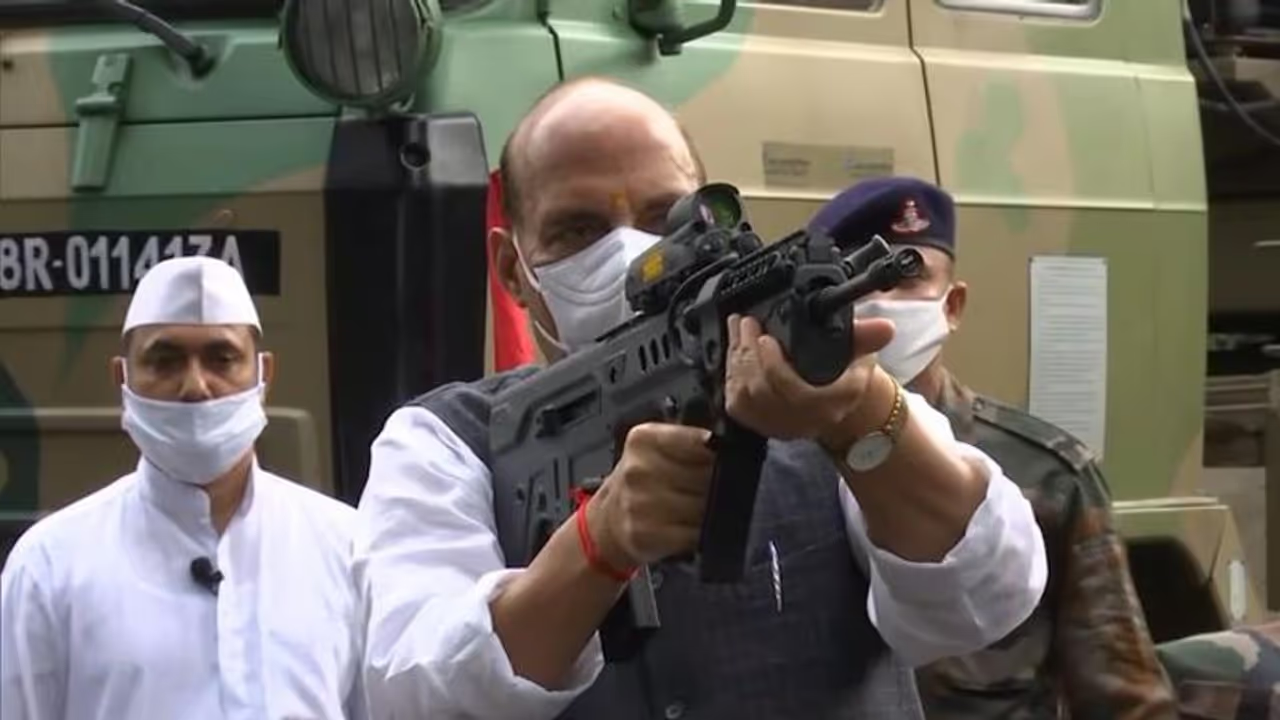Defence Minister Rajnath Singh says India is determined to protect its sovereignty and territorial integrity in the face of unilateralism and aggression, no matter what the sacrifice.
Defence Minister Rajnath Singh on Thursday said that India is determined to protect its sovereignty and territorial integrity in the face of unilateralism and aggression, no matter what the sacrifice.

Rajnath was delivering a keynote address at the ‘Diamond Jubilee Webinar of National Defence College with the theme 'India’s National Security- The Decade Ahead'.
Here are highlights of Rajnath's address:
* India has also forged a very special partnership with reliable friends like France and Israel. We value their support and will continue to build upon it in the future as well.
* India is determined to protect its sovereignty and territorial integrity in the face of unilateralism and aggression, no matter what the sacrifice.
* India also has strong, traditional and deep-rooted relations with Russia. Our two countries have weathered many a challenge in the past through our close understanding and appreciation of each other’s concerns and interests.
* With the exception of Pakistan, given its agenda of fuelling terrorism, India has improved its relations with all neighbours. We have invested heavily to help and support our friends to forge a relationship of mutual-respect and mutual-interest.
* As India grows, there is a simultaneous movement of people beyond our shores and a growth of our interests worldwide. This entails that we should be able to safeguard Indian citizens who now work across the globe
* PM Narendra Modi took special interest in reaching out to our partner countries in West Asia, South East and East Asia. We have enhanced the scope and quality of our relations with Saudi Arabia, UAE and Oman in the West and with Indonesia, Vietnam and South Korea in the East
* One of the most important elements of India’s foreign and security policy is characterised by the "Neighbourhood First" initiative
* Our vision for Make in India for defence manufacturing is being implemented with the long-term of making India more self-reliant. We have received a very encouraging response in this regard & further changes will be undertaken to improve the existing policy as and when needed.
* Our interests to secure trade routes, shipping lines of communication, fishing rights and communication networks also require the ability to contribute to the global effort, to maintain open and free oceans.
* India has been facing other challenges on its borders. India is a peace-loving country. We believe that differences should not become disputes. We attach importance to the peaceful resolution of differences through dialogue.
* India has been facing other challenges on its borders. India is a peace-loving country. We believe that differences should not become disputes. We attach importance to the peaceful resolution of differences through dialogue
* Peace can only be ensured through the ability to deter war. We have attempted to build this deterrence through a judicious combination of capability development and an emphasis on long term policy of indigenisation.
* It has always been a challenge to foresee future security challenges. However, the ability to think through possibilities, create capabilities and redundancies is possibly the best way forward to prepare for them
* We have achieved substantial success in working with progressive and like-minded countries to not only expose Pakistan’s regressive policies but also make it increasingly difficult to continue with its previous business as usual approach
* India has a more closely interlinked and coordinated security network. We have not only created the appointment of CDS and established the DMA, but are also in the process of further integrating the armed forces through both theatre and functional commands.
* We have undertaken a three-pronged approach towards internal security challenges as well. This includes development of areas affected by terrorism along with the provision of justice to the aggrieved
* Based on these principles, we have brought about drastic changes in our security policy which are oriented towards strong, legally and morally tenable actions.
* The last six years provide a blueprint for India’s approach towards national security over the next decade.
* Let me outline four broad principles that are likely to guide our quest for national security in the future.
1) The first is the ability to secure India’s territorial integrity and sovereignty from external threats and internal challenges
2) The ability to create secure and stable conditions that can facilitate India’s economic growth, thereby, creating the resources for nation building and to meet individual aspirations
3) We remain steadfast in the desire to protect our interests beyond the borders in areas where our people reside and our security interests converge
4) In a globalised and interconnected world, a country’s security interests are interlinked by shared and secure commons.
* Perhaps the most fundamental lesson that the roller coaster of the rise and fall of nations taught us was that peace cannot necessarily be achieved by a desire for peace but by the ability to deter war
